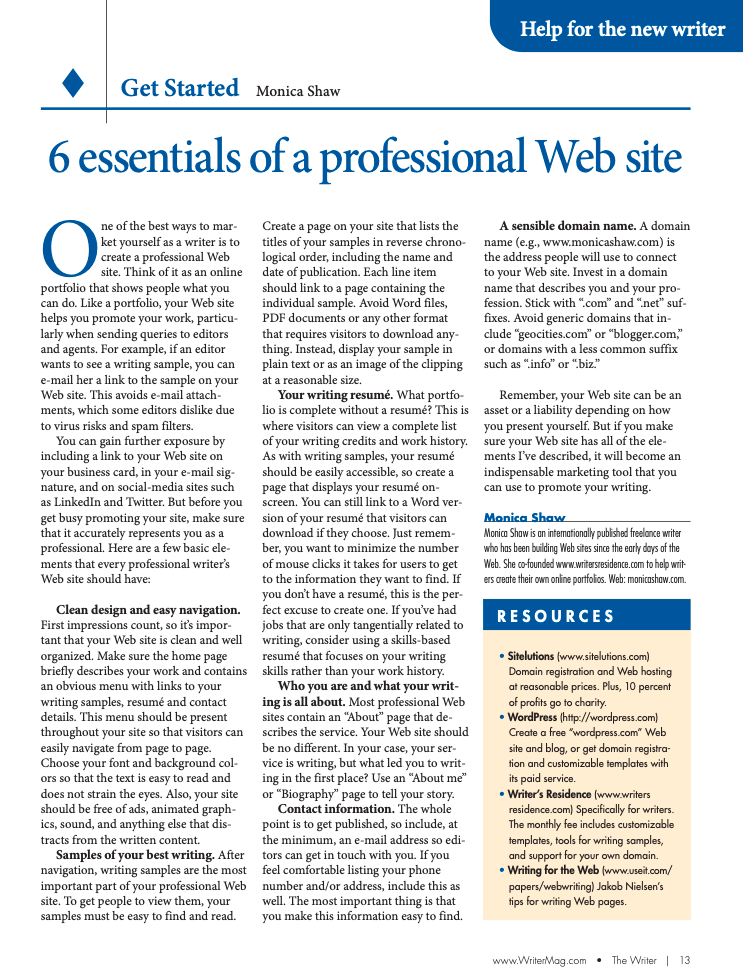
6 essentials of a professional website
The Writer - January 18, 2010
This article was written for The Writer magazine in 2010, when the internet was still emerging as a powerful marketing tool for writers. Its goal was to introduce writers to the concept of an online writing portfolio and guide them on what to include. The article emphasized the importance of enhancing professionalism by adopting this trend early, which has since become a standard practice in today’s writing industry.
A website is a must-have tool for anyone serious about making writing their business. But these days it seems like most people have a blog or a website, or at the bare minimum, a LinkedIn page. With so much web content competing for attention, what does it take to make your website stand out from the crowd?
This article covers the 6 essential elements of a professional website, including:
- Who you are and what your writing is all about
- Samples of your best writing
- Your writing resume
- Contact information
- Clean design and easy navigation
- A sensible domain name
6 essential elements of a professional website by Monica Shaw
One of the best ways to market yourself as a writer is to create a professional website. Think of it as an online portfolio that shows people what you can do. Like a portfolio, your website helps you promote your work, particularly when sending queries to editors and agents. For example, if an editor wants to see a writing sample, you can email them a link to the sample on your website. This avoids email attachments, a practice that many editors discourage due to virus risks and spam filters.
You can gain further exposure by including a link to your website on your business card, in your email signature, and on social media sites such as LinkedIn and Twitter. But before you get busy promoting your site, make sure that it accurately represents you as a professional. To help you get started, here are a few basic elements that every professional writer’s website should have:
Clean design and easy navigation
First impressions count, so it’s important that your website is clean and well organized. Make sure the front page (the page that visitors see first) briefly describes your work and contains an obvious menu with links to your writing samples, resume and contact details. This menu should be present throughout your site so that visitors can easily navigate from page to page. Choose your font and background colors so that the text is easy to read and does not strain the eyes. Also, your site should be free of ads, animated graphics, sound and anything else that distracts from the written content.
Samples of your best writing
After navigation, writings samples are the most important part of your professional website. But in order to get people to view them, your samples must be easy to find and read. Create a page on your site that lists the titles of your samples in reverse chronological order, including the name and date of publication. Each line item should link to a page containing the individual sample. Avoid Word files, PDF documents, or any other format that requires visitors to download anything. Instead, display your sample in plain text or as an image of the clipping at a reasonable size.
Your writing resume
What portfolio is complete without a resume? This is where visitors can view a complete list of your writing credits and work history. As with writing samples, your resume should be easily accessible, so create a page that displays your resume on screen. You can still link to a Word version of your resume that visitors can download if they choose. Just remember, you want to minimize the number of mouse clicks it takes for users to get to the information they want to find. If you don’t have a resume, this is the perfect excuse to create one. Many writers have had jobs that are only tangentially related to writing, so consider using a skills-based resume that focuses on your writing skills rather than your work history.
Who you are and what your writing is all about
Most professional websites contain an “About” page that describes the service. Your website should be no different. In your case, your service is writing, but what led you to writing in the first place? Use an “About me” or “Biography” page to tell your story.
Contact information
The whole point is to get published, so include, at the bare minimum, an e-mail address so editors can get in touch with you. Also list member names of any online messaging services you belong to, such as Skype, AOL Instant Messenger or Twitter. If you feel comfortable listing your phone number, include this as well. The most important thing is that you make this information easy to find.
A sensible domain name
A domain name is the address that people will use to connect to your website (for example, monicashaw.com). Invest in a domain name that describes you and your profession. Stick with “.com” and “.net” suffixes. Avoid generic domains like geocities.com or blogger.com, or domains with a less common suffix such as “.info” or “.biz.”
Remember, your website can be an asset or a liability depending on how you present yourself. But if you make sure your website has all of the above elements, it will become an indispensable marketing tool that you can use over and over again to promote your writing.
Click on the link below to download the article in full.
